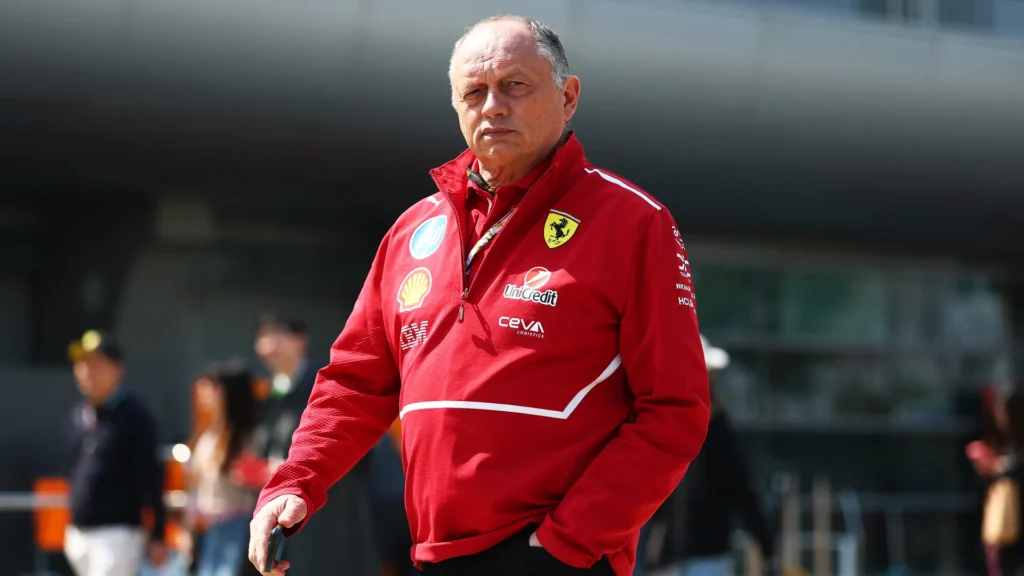
Amidst widespread speculation regarding Ferrari team principal Fred Vasseur’s future, ex-F1 driver Ralf Schumacher asserts that Vasseur is not responsible for Ferrari’s struggles.
Refuting that “rumour” as “false”, Schumacher asserted that there is a broader issue of tasks not being completed at Ferrari, as the team has experienced a disappointing beginning to the F1 2025 season.
Ferrari was pursuing a new championship after finishing second to McLaren in the final race for the 2024 Constructors’ title, but while McLaren has advanced in F1 2025, building what appears to be an insurmountable lead, Ferrari has declined.
Having achieved only one Sprint win and three podium finishes, Ferrari is currently in P3 in the Constructors’ standings of F1 2025, trailing McLaren by 191 points.
Prior to the Canadian Grand Prix, Italian media reports indicated that Vasseur’s role as Ferrari team principal – a position he has occupied since 2023 – is now uncertain.
A report in Germany suggested that Ferrari had reached out to Red Bull team principal Christian Horner, which PlanetF1.com corroborates – however, in an exclusive interview with PlanetF1.com, Horner rejected any notion of a Red Bull exit.
However, Ralf Schumacher – a six-time grand prix champion in his F1 career – believes that Vasseur is not the sole reason for Ferrari’s struggles.
“Rumors suggest that Fred Vasseur is the one holding back, but that’s false,” Schumacher stated on the Backstage Boxengasse podcast.
“In reality, numerous tasks are not performed as they ought to be, even though they have been asked for.”
Schumacher emphasized that the issues facing Ferrari are systemic and stem from deeper organizational challenges that extend far beyond the responsibilities of the team principal. While Vasseur may be the most visible figure within the team, Schumacher made it clear that internal inefficiencies and delays in executing critical tasks are hampering Ferrari’s progress more than any leadership decisions.
Ferrari’s performance throughout the 2025 season has been marked by inconsistency and missed opportunities. Despite boasting one of the most experienced and celebrated driver line-ups with Charles Leclerc and Lewis Hamilton, the team has failed to capitalize on their talent, often struggling to compete with the pace and precision of McLaren and Red Bull.
The lack of development progress, coupled with strategic missteps during race weekends, has further deepened concerns about the direction the team is heading. Vasseur, who took the reins following Mattia Binotto’s departure at the end of 2022, was initially seen as a stabilizing force. His previous success with Alfa Romeo and long-standing motorsport management experience made him an attractive candidate for Ferrari’s top job.
However, with the 2025 championship slipping away and internal morale reportedly under pressure, speculation has grown regarding his tenure.
Should Ferrari ultimately decide to move in a new direction, Schumacher floated a potential replacement he believes could bring renewed focus and leadership. Antonello Coletta, head of Ferrari’s successful hypercar program, and former Renault and Benetton boss Flavio Briatore have been linked to the position. Yet Schumacher identified another candidate he views as the ideal choice.
“Today, if I had to make a choice, I would select Andreas Seidl,” he remarked. “However, Andreas Seidl cannot accomplish it by himself. He requires stability in his environment.”
Seidl, who recently stepped down as CEO of Sauber, previously played a pivotal role in McLaren’s resurgence during his tenure as team principal. Known for his structured leadership and engineering background, Seidl would bring significant Formula 1 experience and credibility to any team in transition. Schumacher’s endorsement reflects a belief that Seidl could help reset Ferrari’s direction if a change in leadership were deemed necessary.
Nonetheless, Schumacher was adamant that blaming Vasseur alone would be reductive and ultimately unhelpful. He pointed to the importance of continuity and patience in leadership roles within F1, stressing that transformation cannot occur without the cooperation and accountability of the entire organization.
During the Canadian Grand Prix weekend, Vasseur addressed the swirling rumors and pushed back against the narrative that he might be on the chopping block. Aware of the destabilizing effect such speculation could have on the team’s personnel and focus, he took a firm stance.
“To conclude this matter, as I don’t wish to exacerbate the situation, I was fully aware of this when I joined Ferrari, and I can only hold myself accountable; if I wanted to avoid this type of narrative, it would have been wiser to stay away,” Vasseur said post-race.
“However, it’s extremely difficult for the team, for the 1500 individuals, to have their name circulated like this in the media, ‘Alright, you must change this one’, because it’s not merely a name or a title, it’s someone with a family who will have seen that.”
Vasseur’s comments reflect the personal toll of public speculation in the high-stakes world of Formula 1. With such a large workforce behind every on-track performance, sudden managerial upheaval can reverberate far beyond the pit wall, impacting team cohesion and morale.
For now, Ferrari remains publicly committed to improvement, but the pressure is mounting as McLaren and Red Bull continue to set the pace. Whether Vasseur remains at the helm for the long term may depend not only on race results but also on Ferrari’s ability to build and sustain internal harmony during this critical period of underperformance.


